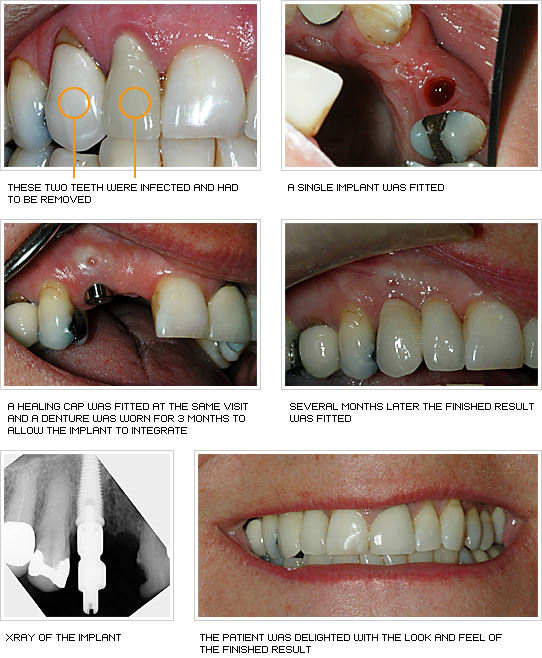The 5-Second Trick For Dental Sense
Table of Contents4 Easy Facts About Dental Sense ShownWhat Does Dental Sense Do?A Biased View of Dental SenseThe 7-Second Trick For Dental Sense
are medical tools operatively implanted right into the jaw to recover an individual's capability to chew or their look. They supply assistance for fabricated (phony) teeth, such as crowns, bridges, or dentures. When a tooth is lost as a result of injury or illness, a person can experience difficulties such as fast bone loss, malfunctioning speech, or modifications to eating patterns that lead to pain.Oral implant systems consist of a dental implant body and oral implant joint and may also include an abutment addiction screw. Dental implant vs bridge. The dental implant body is surgically inserted in the jawbone instead of the tooth's root. The dental implant joint is typically connected to the implant body by the abutment fixation screw and expands with gum tissues into the mouth to support the connected fabricated teeth
(https://padlet.com/matthewmusic33101/dental-sense-ljnep063jjnbcvdg)Structure of The Oral Implant System picking dental implants, talk to your dental company about the possible benefits and dangers, and whether you are a candidate for the treatment. Things to consider: Your overall health is a crucial variable in determining whether you are an excellent candidate for oral implants, how much time it will require to heal, and how much time the implant may remain in area.
Cigarette smoking may affect the recovery procedure and reduce the lasting success of the implant. The recovery procedure for the implant body might take a number of months or longer, during which time you commonly have a short-lived joint in place of the tooth. the dental implant procedure: Carefully follow the oral health guidelines provided to you by your oral provider.
Some Of Dental Sense
Implant failure can lead to the requirement for one more surgery to take care of or change the dental implant system. Restores the capacity to chew Restores aesthetic appearance Aids maintain the jawbone from reducing as a result of bone loss Preserves the wellness of the surrounding bone and gum tissues Assists maintain adjacent (neighboring) teeth steady Boosts high quality of life Damage to bordering all-natural teeth throughout dental implant placement Injury to the surrounding cells throughout surgery, such as sinus opening Injury throughout surgical procedure (for instance, fracture of surrounding jawbone) Inadequate function, such as seeming like the teeth do not bite with each other generally A feeling that the tooth is loose or turning in position resulting from an abutment screw loosening up Implant body failure (looseness of the implant body) because of systemic infection, which may be most likely in patients with uncontrolled diabetes because of local infection in bone and periodontals supporting the dental implant body due to delayed recovery, which might be more probable in clients who smoke Trouble cleansing the periodontals around the dental implant, resulting in bad oral hygiene Untreated periodontal condition Post-surgical numbness as a result of nerve impingement or damages Constantly inform healthcare suppliers and imaging specialists that you have oral implants prior to any kind of magnetic resonance imaging (MRI) or x-ray read what he said procedures.
FDA is not knowledgeable about any type of adverse occasions reported for MRI or x-ray treatments with dental implants. Dental implants systems are commonly constructed from products that comply with global agreement standards of the International Organization for Standardization (ISO) or ASTM International. These criteria have details of what makes a safe product.

An oral implant is a framework that changes a missing tooth. With screw-like devices, the doctor inserts a dental implant right into the jawbone, and it acts as an anchor for a synthetic tooth, called a crown.
The Ultimate Guide To Dental Sense
Some individuals are not eligible for dental implant surgery. It is for oral surgeons to operate individuals with: acute illnessuncontrollable metabolic diseasebone or soft cells condition or infectionIf these issues are solved, an individual can have the surgical procedure. In, dental cosmetic surgeons avoid operating on individuals with: If individuals with any one of the above undergo oral implant surgery, there is a higher risk of the dental implant failing.

Oral implant surgery is an individualized procedure. It's not the exact same for every person. Yet the following gives a general overview of what you can expect your dental professional, oral cosmetic surgeon, periodontist or prosthodontist to do: Put the implant operatively. Provide you time to heal. Connect the article and final crown, bridge or denture.
Next off, your specialist will thoroughly put the oral implant into your jaw. Lastly, your surgeon will reposition your gums and shut the incision with stitches. If your implant is near the front of your mouth, your dental professional will certainly make a short-lived tooth for you to wear till you recover. That means, you won't have a space in your smile while you recover.
Everything about Dental Sense
Throughout the healing stage, your jawbone should fuse to the dental implant. This procedure can take anywhere from three to 9 months.
When your implant heals, your dentist can attach the joint (tiny adapter blog post) and your final repair (crown, bridge or denture). This generally takes regarding one hour to complete and might require a second small surgery. You shouldn't really feel any type of discomfort during your oral implant treatment because your service provider will certainly make use of medication to numb your periodontals.